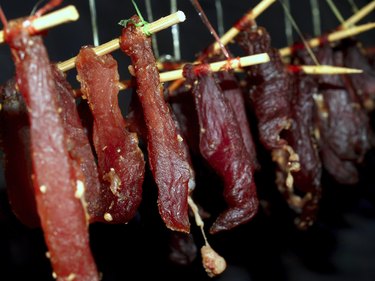
Sodium nitrite is used in curing meats to preserve color, add flavor, prevent fats from going rancid and stop botulism spores from becoming toxic. For example, a roasted leg of pork is brown, but add sodium nitrite and it becomes ham - pink, salty with a totally different flavor. Sodium nitrite can not be used in any product labeled organic, so natural alternatives are becoming more important to the meat industry.
Sea Salt
Video of the Day
A salt brine is made from water, sea salt and vinegar. Meat is cured in brine for at least 6 days, with no refrigeration needed. This is the oldest and least expensive way to cure meat, and doesn't require any specialized equipment. You can change the flavor of the brine by using different types of vinegar or various salts and by adding seasonings. Sea salts have distinct flavors depending on which body of water they are from - different mineral contents affect color and taste.
Video of the Day
Salt, Sugar and Saltpeter
An old-fashioned meat cure used in the late 1800's involved sugar, salt and saltpeter. This dry rub must be done in very cold temperatures. Salt provides the cure, sugar adds flavor and stops the salt from hardening the meat, preserving the texture and saltpeter enhances the red color. Use only non-iodized salt, such as kosher or canning salt and make sure the temperature doesn't fall below 38 degrees Fahrenheit, or the salt will not fully penetrate the meat.
Sodium Alginate and Calcium Lactate
This is a two-part system that uses sodium alginate, made from brown seaweed, and calcium lactate, a dairy product, to bind together meat products. Using this system is a cost-effective method that doesn't use salt or phosphates and can be used for all types of meats, including fish. This is an industrial process and not suitable for home chef, as it requires equipment and chemicals not readily available to the general public.
Celery Juice
Celery juice concentrate is a vegetable product, but has a significant amount of naturally occurring nitrate. Celery juice has very little pigment and a mild taste that does not detract from the meat's flavor. Furthermore, celery juice or celery salt may be listed as natural flavoring on meat product labels. Although there are still nitrates present, your body reacts differently to natural vs. synthetic nitrates. For example, celery salt also contains high levels of antioxidants, which help your body process the nitrates.
- Iron-Clay.com: Salt Curing Meat in Brine
- Sugar Mountain Home: Curing Meat
- Prepared Foods Network: Formulation Trends in Processed Meats and Alternatives -- January 2009
- American Meat Science Association: Natural and Organic Cured Meat Products: Regulatory, Manufacturing, Marketing, Quality and Safety Issues
- Feed Stuffs Food Link: Nitrates